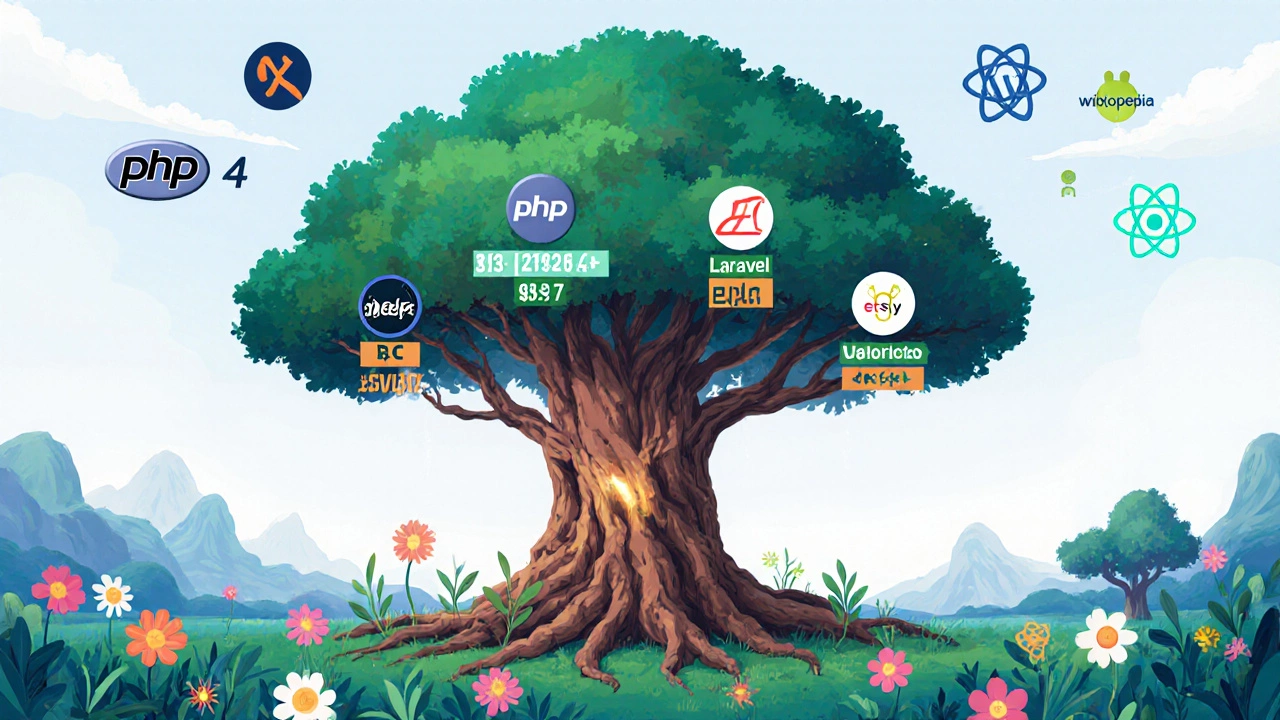PHP Developer Earnings Calculator
PHP Job Market Value Calculator
Estimate your potential earnings as a PHP developer based on location, experience level, and work type. Based on data from 2024 job market reports
Estimated Earnings
$0 - $0 per hour
Based on 2024 job market data from 1.2 million+ PHP-related job postings
* WordPress roles typically pay 15-20% higher than general PHP positions
PHP isn’t dead. But if you’re asking whether you should learn it in 2024, you’re not just wondering about code-you’re wondering if your time will pay off. The answer isn’t yes or no. It’s: PHP still powers over 77% of all websites that use a server-side language, and if you want to work on WordPress, Shopify, or legacy enterprise systems, you’ll need it.
PHP is still running the web
You might think modern frameworks like React and Node.js have replaced PHP. They haven’t. WordPress alone runs 43% of all websites on the internet. And WordPress? Built on PHP. So do major platforms like Wikipedia, Slack’s backend, Etsy, and even Facebook in its early days. Today, Facebook uses Hack-a language derived from PHP-but the core architecture still traces back to it.
Every time you update a plugin on your WordPress site, edit a WooCommerce product, or troubleshoot a theme issue, you’re interacting with PHP. Companies don’t abandon systems that work. They don’t rewrite millions of lines of code just because a new language looks shinier. If you want to build or maintain real-world websites, PHP isn’t optional-it’s unavoidable.
What PHP does better than newer languages
PHP isn’t the fastest or the most elegant language. But it’s simple to get started with, and it’s built for the web. Unlike Python or Ruby, which need extra setup to serve web pages, PHP was designed from day one to run inside a browser. You write a file called index.php, drop it on a server, and it just works.
That simplicity matters. For small businesses, freelancers, and agencies, PHP means faster turnaround. You don’t need a complex build process, Docker containers, or a team of DevOps engineers to deploy a site. A $5/month shared hosting plan can run a full WordPress store. That’s not possible with most modern stacks.
PHP also has the best ecosystem for content-heavy sites. Plugins, themes, page builders-everything is built around PHP. Even when you use a headless CMS, the backend is often still PHP. Learning PHP gives you direct access to the engine behind the scenes, not just the frontend wrapper.
Who should still learn PHP in 2024?
If you’re aiming for one of these roles, PHP is a smart move:
- You want to work with WordPress-custom themes, plugins, or performance optimization
- You’re targeting small to mid-sized businesses that use WooCommerce, Shopify (Liquid is easy, but backend is PHP-based)
- You plan to freelance and need to fix broken sites quickly
- You’re joining a company that still uses legacy systems like Drupal, Magento, or Joomla
- You’re not starting from scratch-you already know HTML/CSS and want to add backend skills
These aren’t niche markets. They’re the backbone of the web. In the U.S. alone, there are over 1.2 million job postings for WordPress developers annually. Most of them require PHP knowledge. Even if you never write raw PHP again, understanding it helps you debug, optimize, and communicate with developers.

What PHP can’t do anymore
Let’s be honest-PHP isn’t ideal for everything. You wouldn’t build a real-time chat app, a mobile backend, or a data-heavy SaaS product with vanilla PHP in 2024. For those, Node.js, Python (Django/Flask), or Go are better choices.
PHP’s strengths are in content delivery, form handling, and database interactions. It’s not built for heavy asynchronous processing or microservices. If you’re trying to build the next TikTok or Uber, PHP isn’t your tool. But if you’re building a blog, a portfolio site, a small online store, or a membership portal? PHP is still the fastest way to get there.
PHP isn’t stuck in the past
People think PHP is outdated because they remember PHP 4 from 2002. That version had security holes, confusing syntax, and no object model. PHP 8, released in 2020, is a completely different language. It includes:
- Union types-so you can say a function returns either a string or null
- Named arguments-no more guessing what the 3rd parameter does
- Match expressions-cleaner than switch statements
- Just-in-time (JIT) compilation-making PHP 30-50% faster for heavy logic
Modern PHP frameworks like Laravel and Symfony feel like working with Python or Ruby. They’re clean, well-documented, and use dependency injection, middleware, and testing tools you’d expect from any modern stack. Laravel even has a built-in queue system, task scheduler, and API authentication-things you’d normally build from scratch in older PHP versions.
PHP vs JavaScript: Which should you learn first?
JavaScript dominates front-end development. But if you only learn JavaScript, you’re limited to the browser. To handle user logins, process payments, or save data, you need a server. That’s where PHP comes in.
Here’s the reality: most web jobs need both. You don’t have to choose one over the other-you need to understand both. But if you’re starting out and want to land your first job fast, PHP + WordPress gives you a direct path. You can build a working site in a weekend. With Node.js, you’re dealing with npm, Express, MongoDB, and authentication libraries before you even see a webpage.
PHP is the shortcut to real-world results. JavaScript is the future. But the present? Still runs on PHP.

How to start learning PHP today
If you decide to learn PHP, here’s how to do it without wasting time:
- Start with WordPress. Install it locally using Local by Flywheel or XAMPP. Edit a theme file. Change the header text. That’s your first PHP file.
- Learn how to write a simple plugin. Use the WordPress hook system. Add a custom field to a post.
- Move to Laravel. Build a blog with user registration. Use Blade templates and Eloquent ORM.
- Learn MySQL basics. PHP doesn’t work without a database.
- Practice on real projects. Fix a broken WooCommerce checkout. Optimize a slow WordPress site.
You don’t need a computer science degree. You don’t need to memorize algorithms. You need to solve real problems. That’s what employers care about.
Is PHP going away anytime soon?
No. The PHP community is active. PHP 8.3 came out in December 2023. PHP 8.4 is scheduled for late 2024. The language is evolving. The job market isn’t shrinking-it’s aging. And aging systems need maintainers.
Think of it like plumbing. You don’t need to install copper pipes anymore-PVC is cheaper and easier. But if your house was built in 1985, you still need someone who knows how to fix the old pipes. That’s PHP today. It’s not the new standard. But it’s the standard that’s still working.
If you avoid PHP because it’s "old," you’re ignoring 77% of the web. You’re choosing to work only on the shiny new apps-and leaving the rest to others. The truth? The most stable, well-paying web dev jobs aren’t in startups. They’re in companies that have been around for 15+ years. And those companies still run on PHP.
Final decision: Should you learn PHP?
If you want to:
- Work for small businesses
- Freelance with low barriers to entry
- Fix or maintain WordPress sites
- Get hired fast without a portfolio of complex apps
- Understand how the majority of websites actually work
Then yes. Learn PHP. It’s not glamorous. It’s not trendy. But it’s reliable. And it pays.
If you want to build AI-powered apps, real-time dashboards, or mobile backends? Start with JavaScript or Python. But don’t ignore PHP. Learn it alongside. You’ll thank yourself when a client asks you to fix their 10-year-old e-commerce site-and you can do it in an afternoon.
Is PHP still relevant in 2024?
Yes. PHP powers over 77% of websites using server-side languages, including 43% of all websites via WordPress. Major platforms like Etsy, Wikipedia, and Slack still rely on PHP. It’s not going away-it’s aging, but still actively maintained and updated.
Is PHP better than JavaScript for web development?
They serve different roles. JavaScript runs in the browser and handles interactivity. PHP runs on the server and handles data, users, and content. For full-stack work, you need both. But if you’re starting out and want to build a working site fast, PHP with WordPress is easier and faster than setting up a JavaScript backend.
Can I get a job with just PHP skills?
Absolutely. There are over 1.2 million WordPress-related job postings in the U.S. each year, and most require PHP. Freelancers who fix WooCommerce sites, optimize WordPress speed, or build custom plugins earn $40-$100/hour. You don’t need to know React or Node.js to land these jobs.
Is PHP secure?
PHP itself isn’t insecure-it’s how it’s used. Modern PHP (8.x) has built-in protections like typed properties, scalar type hints, and prepared statements. The real risk comes from outdated plugins, poor coding practices, or ignoring updates. Stick to Laravel or WordPress with updated plugins, and you’ll be safer than many JavaScript apps with unpatched dependencies.
Should I learn PHP or Python first?
If you want to build websites quickly and land freelance work, learn PHP with WordPress. If you want to work in data science, AI, or enterprise software, learn Python. For web development, PHP gives you faster results. Python gives you broader career options. Choose based on your goals, not trends.
Does PHP have a future?
Yes. PHP 8.3 and 8.4 are adding major performance and safety improvements. The language is actively developed, and the job market for PHP developers isn’t shrinking-it’s becoming more specialized. Companies aren’t replacing PHP systems-they’re hiring people to maintain and modernize them. That’s a stable, long-term career path.
